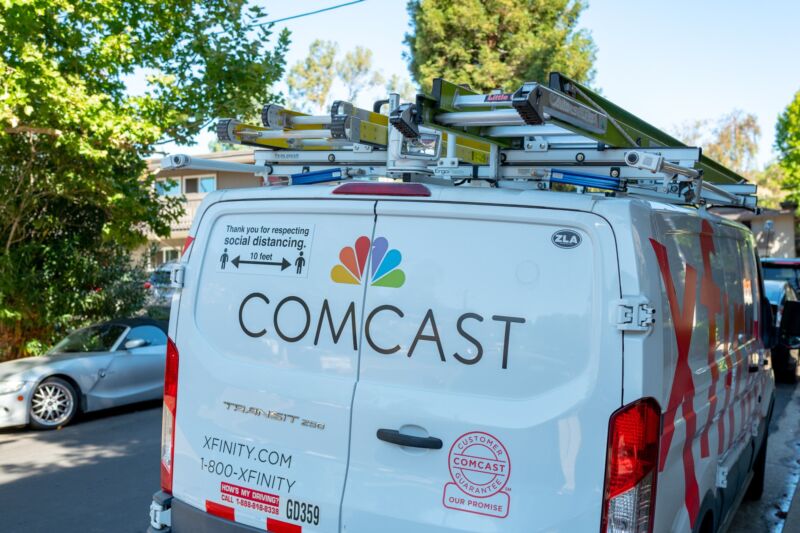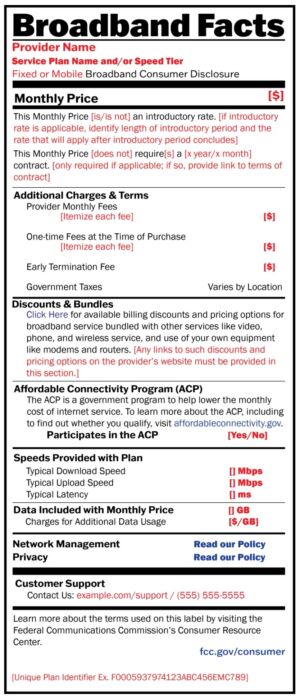Comcast complains to FCC that listing all of its monthly fees is too hard

Comcast is not happy about new federal rules that will require it to provide broadband customers with labels displaying exact prices and other information about Internet service plans.

In a filing last week, Comcast told the Federal Communications Commission that it is “working diligently to put in place the systems and processes necessary to create, maintain, and display the labels as required.” But according to Comcast, “two aspects of the Commission’s Order impose significant administrative burdens and unnecessary complexity in complying with the broadband label requirements.”
Comcast noted that five major cable and telecom industry trade groups petitioned the FCC in January to change the rules. Comcast’s new filing urged the FCC to grant the petition “as soon as possible before the rules become effective to help providers streamline and simplify their labeling processes, which will ultimately benefit consumers.”
The FCC was required to implement broadband label rules in a 2021 law passed by Congress. Although the FCC approved the label rules in November 2022, it’s not clear when they will take effect. They are subject to a federal Office of Management and Budget (OMB) review because of requirements in the US Paperwork Reduction Act. Medium-sized and large ISPs would be required to comply six months after the OMB review, while providers with 100,000 or fewer subscribers would have one year to comply.
“The label hasn’t even reached consumers yet, but Comcast is already trying to create loopholes. This request would allow the big ISPs to continue hiding the true cost of service and frustrating customers with poor service. Congress created the label to end these practices, not maintain them, and Comcast offers no compelling reason for the FCC to violate Congress’ intent,” Joshua Stager, policy director at media advocacy group Free Press, told Ars. Stager previously advocated for the broadband labels when he was deputy director of New America’s Open Technology Institute.
The FCC rules require ISPs to display the labels at the point of sale. The labels must disclose broadband prices, introductory rates, data allowances, Internet speeds, and include links to information about an ISP’s network management practices and privacy policies.
Comcast doesn’t want to list all monthly fees
Comcast pointed to “recent filings regarding the Commission’s underestimation of the burdens associated with implementing the broadband consumer label rules.” Those filings came from Verizon, AT&T, Lumen (aka CenturyLink), and a trade group representing rural broadband providers.
Comcast and other ISPs have annoyed customers for many years by advertising low prices and then charging much bigger monthly bills by tacking on a variety of fees. While some of these fees are related to government-issued requirements and others are not, poorly trained customer service reps have been known to falsely tell customers that fees created by Comcast are mandated by the government.
The FCC rules will force ISPs to accurately describe fees in labels given to customers, but Comcast said it wants the FCC to rescind a requirement related to “fees that ISPs may, but are not obligated to, pass through to customers.” These include state Universal Service fees and other local fees.
As Comcast makes clear, it isn’t required to pass these costs on to customers in the form of separate fees. Comcast could stop charging the fees and raise its advertised prices by the corresponding amount to more accurately convey its actual prices to customers. Instead, Comcast wants the FCC to change the rule so that it can continue charging the fees without itemizing them.
The portion of the FCC order that Comcast and other ISPs object to says that “providers must list all recurring monthly fees,” including “all charges that providers impose at their discretion, i.e., charges not mandated by a government.”
Comcast wrote:
[T]he Order appropriately refrains from requiring ISPs to itemize state and local taxes, recognizing that they “often vary according to a customer’s geographic location.” The Order adopts the same treatment for government fees that a “relevant state or local government ‘mandate[s]'” must be passed through to customers… However, the Order appears to take a different tack with respect to fees that ISPs may, but are not obligated to, pass through to customers. The language of the Order creates much uncertainty over how ISPs must treat these fees on their labels because it may be read to require ISPs to itemize each of these pass-through government-imposed fees on their labels… If these fees must be itemized, a separate label must be created for each unique combination of applicable nonmandatory pass-through government fees. Itemizing these fees would substantially increase the burden on providers to generate and maintain their labels, particularly as the fees are subject to change, in some cases as often as quarterly.
https://arstechnica.com/?p=1947752